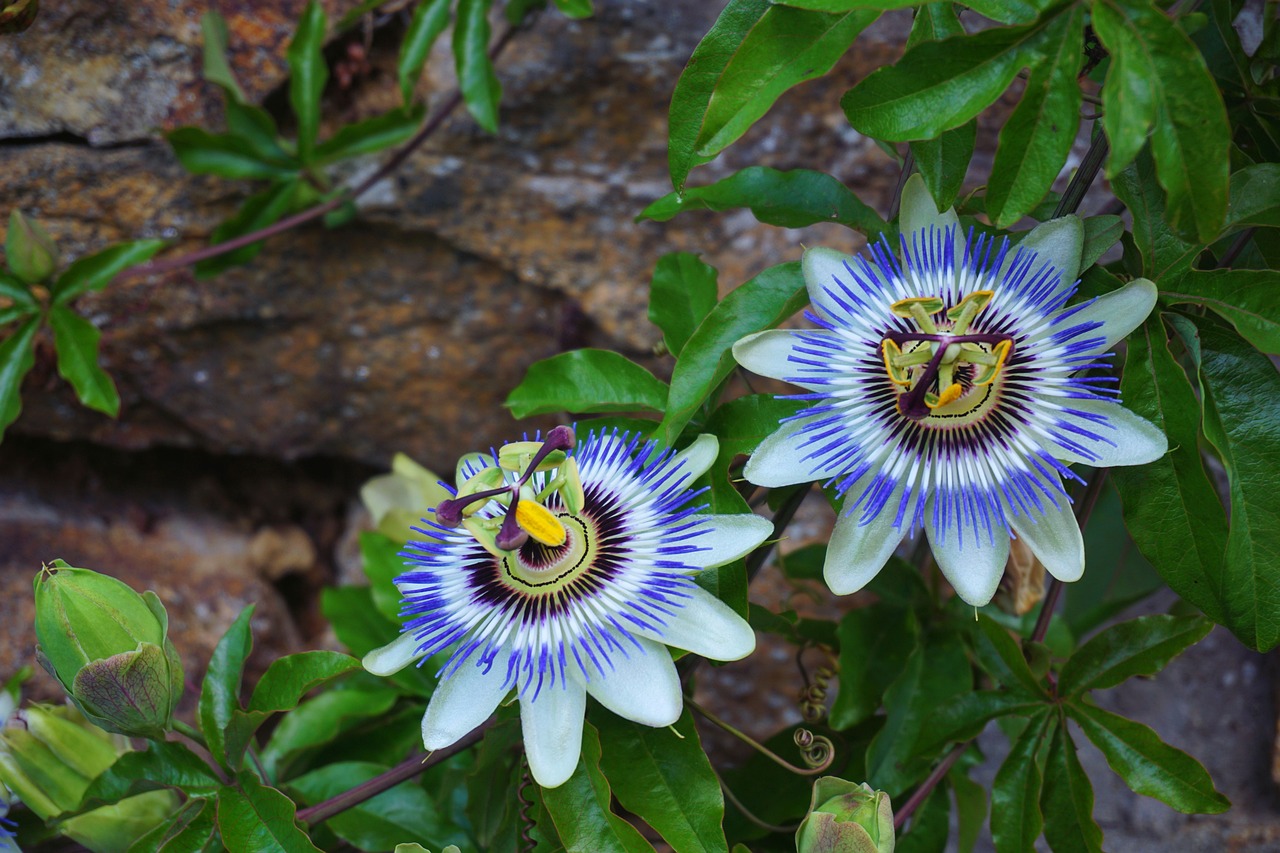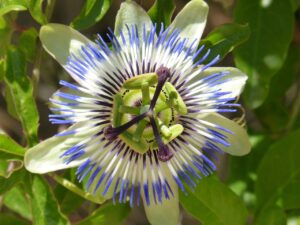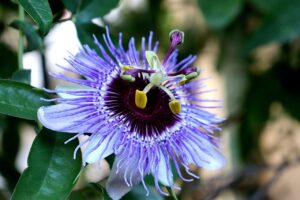Passionflower
Overview
The Passiflora incarnata, or passionflower, is a captivating perennial vine revered for its ornate flowers and multifaceted traditional uses in herbal medicine. Harvested for its sedative qualities, this plant can help soothe nerves, providing a natural remedy for issues like insomnia and anxiety. With a heritage in Native American healing and a rich symbolism in Christian history, the passionflower continues to be explored for its health benefits and serene inducing effects.
Common name(s): Maypop, Purple Passionflower, True Passionflower, Wild Apricot, Wild Passion Vine
Scientific name: Passiflora incarnata

Characteristics
Known for its intricate flowers, calming medicinal properties, and diverse range of active compounds such as flavonoids and alkaloids.
Region
Perennial climbing vine native to the southeastern United States.
Natural Habitat
Typically found in fields, roadsides, and the edges of forests in the southeastern United States.
Cultivation
Prefers full sun to partial shade, consistent moisture without waterlogging, and well-drained soil rich in organic matter.
Traditional Usage
Passionflower has been traditionally used for its therapeutic effects and is valued for its potential to address various ailments. The indigenous use of passionflower reveals its historical significance in herbal medicine:
- Helping to soothe wounds
- Providing relief for earaches
- Supporting liver function
- Acting as a natural sedative
- Promoting better sleep
These uses have been observed across different Native American tribes, showcasing a consistent appreciation for the herb’s healing capabilities. As people today seek out natural remedies, understanding and respecting these traditional uses is crucial. Passionflower remains a part of contemporary herbal practices, often recommended for its calming and sleep-enhancing properties2.
Historical Usage
Used by Native American tribes for wounds, earaches, liver problems, and as a sedative and sleep aid.
Common Usage
Currently used as an herbal remedy for anxiety, insomnia, and certain other health conditions.
Effects
When used properly, the passionflower herb may offer a suite of calming and therapeutic benefits. Many find that passionflower has a soothing influence which makes it a popular choice for those seeking natural remedies to support mental well-being and relaxation. Below are some general effects associated with this herb:
- Passionflower can have a tranquilizing impact, which helps in managing stress and anxiety levels. It is often sought after for its potential to create a sense of calm.
- As a sleep aid, passionflower is used to promote better sleep quality, making it beneficial for those who experience insomnia or restless nights.
- It might act as a natural hypotensive, meaning it could lower blood pressure in some individuals, contributing to cardiovascular health.
- The plant has anti-spasmodic properties, offering potential relief from muscle spasms and cramps.
While the calming effects of passionflower are well-regarded, it’s crucial to respect dosing guidelines and be aware of individual reactions. Anyone considering using passionflower should also be mindful of potential interactions with other sedatives or medications. Always consult with a healthcare provider for personalized advice before incorporating any new herbal remedy into your routine1 2 3.

Passionflower promotes relaxation, eases anxiety, aids in sleep, helps regulate blood pressure, and alleviates muscle tension.
Effects when smoking
When smoking passionflower, the anticipated effects include a soothing sensation that could aid in calming the nerves. This may offer potential relief from anxiety and help in managing insomnia. These effects are thought to arise from the interaction of the active compounds, particularly with the body’s GABA system, supporting a peaceful state.
However, a critical point to bear in mind is the scarcity of information regarding the direct results of smoking passionflower. It is predominantly consumed as tea or in extract form, and inhaling the smoke of any herb requires caution due to possible respiratory risks. The specific consequences of inhaling passionflower compounds have not been adequately explored.
Users of passionflower in its more traditional preparations often report feelings of tranquility and enhanced sleep quality. While these anecdotal experiences provide some insight, reactions can differ from person to person. Those considering the use of passionflower should be aware of the individuality of responses and the impact of other ingredients in mixed products.
Given the safety profile of Passiflora incarnata when used properly, and its legal status as a dietary supplement in the United States, it remains accessible for those interested in exploring its benefits. Yet it is prudent to approach with care and consult with a healthcare provider for tailored advice and dosing.
Flavor Profile
Earthy and mildly floral flavor profile.
Edible Parts
Flowers and fruit
Effects when Smoked
Effects of smoking passionflower are not well-documented; it is traditionally used as tea or extract.
User Experiences
Users often report improved sleep quality and a feeling of relaxation after using passionflower.
Medicinal Benefits
Passionflower may offer various potential medicinal benefits. The presence of certain alkaloids and flavonoids contributes to its therapeutic properties. People have reported using passionflower for its calming effects on the nervous system, and it may help with conditions such as anxiety and insomnia. Here are some of the notable attributes:
- Calming effects: It can potentially ease anxiety and promote better sleep.
- Pain relief: It may act as a natural analgesic to alleviate pain.
- Lowering blood pressure: The herb has hypotensive properties that could be beneficial for managing blood pressure levels.
- Anti-spasmodic: It may help in relieving muscle spasms.
It’s crucial to follow dosing guidelines and to consult with a healthcare provider for personalized advice.3
History and Folklore
Historical Usage of Passionflower
The passionflower has been embraced for its therapeutic benefits since ancient times. Native American tribes harnessed its properties for treating ailments like wounds and liver issues, and they valued its sedative qualities for earaches and insomnia. European encounters with the plant date back to the 16th century when Spanish explorers learned of its uses and incorporated the plant into their traditional medicine. Its applications were broadened to include its reputation as a sleep aid and calming agent. Significant as well for its symbolic association with the crucifixion of Jesus Christ by Spanish Christian missionaries, passionflower has been a plant of both ornamental and medicinal importance well into the Victorian era.
Passionflower continues to be a respected component in herbal medicine practices due to its rich historical legacy and enduring uses.

From ancient remedies to Victorian symbolism, the passionflower's ornate beauty belies its longstanding medicinal and ornamental legacy.
Side Effects and Contraindications
Passionflower is associated with various side effects, though they are generally mild when the herb is used as directed. Possible adverse reactions may include drowsiness, dizziness, and confusion. Less common effects might involve altered consciousness or impaired coordination.
In terms of contraindications, caution is advised for individuals taking sedatives or central nervous system depressants due to potential additive effects. Passionflower should be avoided during pregnancy and breastfeeding, as the impacts on fetal development are not well understood. Additionally, people with a history of liver disease should consult a healthcare provider before use due to the presence of certain compounds in the plant 1 2.
Legal Status
In the United States, the passionflower is recognized as legal and can be obtained as a dietary supplement. This status highlights its availability and acceptance for traditional use and potential health benefits. However, the legality of passionflower may differ globally. It’s always recommended to consult local regulations to ensure compliance with regional laws before using or possessing passionflower products.
This precautionary step is vital to avoid any legal inconveniences and to adhere to the relevant dietary supplement and herbal product guidelines.
References
1. Passiflora – Wikipedia, https://en.wikipedia.org/wiki/Passiflora
2. Passionflower’s Medicinal & Edible Uses | Chestnut School, https://chestnutherbs.com/passionflower-ecology-cultivation-botany-and-medicinal-and-edible-uses/
3. Passionflower: 4 Benefits, Dosage, & Safety | The Botanical Institute, https://botanicalinstitute.org/passionflower/
Nicolas Duval
Nicolas is a passionate advocate for nature and the art of wildcrafting. His dedication shines through in Wildcraftia, a website he meticulously crafted to serve as a haven for nature enthusiasts worldwide. Driven by a deep appreciation for nature’s connection to humanity, Nicolas embarked on his journey in 2011 with SmokableHerbs, a platform showcasing his love for nature’s bounty. Building upon this foundation, he established Smokably, a thriving online store offering premium herbs and blends to a global audience.
